
Коми Республикаса велöдан, наука да том йöз политика министерство
Министерство образования, науки и молодёжной политики
Республики Коми
Государственное профессиональное образовательное учреждение
«Сыктывкарский торгово-технологический техникум»
|
«РАССМОТРЕНО» Руководитель МО ______________ Чкадуа О.В Протокол № от 2022 года
|
|
«Утверждаю» Директор ГПОУ «СТТТ» _______________Волков В.П. «____» ____________2022года |
Учебное пособие по английскому языку
Тема «Money makes the world go round, doesn’t it?”-
Деньги заставляют мир вращаться, не так ли?»
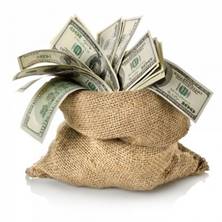
Уровень профессионального образования:
Среднее профессиональное образование в рамках реализации программы
подготовки квалифицированных рабочих и служащих
Мареева Людмила Викторовна
преподаватель английского языка
Сыктывкар
2022 г
Пояснительная записка
Учебное пособие по теме по теме: «Money makes the world go round, doesn’t it?”- Деньги заставляют мир вращаться, не так ли?»
предназначено для углубления и совершенствования знаний, умений и навыков во всех видах речевой деятельности на иностранном языке студентов по специальности:
38.02.05. «Товароведение и экспертиза качества потребительских товаров»;
43.02.14 «Управление качеством продукции, процессов и услуг (по отраслям)»
Цели обучения студентов иностранному языку в среднем профессиональном образовательном учреждении предполагают:
· развитие коммуникативной иноязычной компетенции в основных видах речевой деятельности: говорении, аудировании, чтении и письме;
· формирование умений иноязычного общения по темам и ситуациям, связанным с финансами; ценообразованием, продажей повседневных товаров;
· развитие умений самостоятельной работы с профессионально ориентированной литературой с целью получения нужной информации;
· развитие навыков самостоятельной работы в освоении языка;
· развитие творческого потенциала студентов, их интеллектуальных способностей в процессе языковой подготовки.
Данное, учебное пособие по теме: «Money makes the world go round, doesn’t it?”- Деньги заставляют мир вращаться, не так ли?»
предусматривает расширение лексического запаса, продолжение работы по автоматизации первичных умений и навыков, практическое использование языка в различных формах коммуникации.
В процессе выполнения заданий по видам чтения, переводу, аннотированию и реферированию, в ситуативных диалогах, ролевых играх, дискуссиях осуществляется выработка умения использовать язык в новых для студентов ситуациях, имитирующих естественное общение.
Практическое владение языком включает: умение читать литературу по специальности с целью извлечения нужной информации при минимальном использовании словаря; владение различными видами чтения - изучающим, ознакомительным, просмотровым, поисковым; умение оформить полученную информацию в виде реферата, аннотации, сообщения, доклада; умение принять участие в устном общении с коллегами - носителями языка в рамках тем и ситуаций, обозначенных в программе, включая собственное развернутое высказывание и восприятие такового на слух; умение самостоятельно повышать уровень иноязычной коммуникативной компетенции.
Учебное пособие по теме: «Money makes the world go round, doesn’t it?”- Деньги заставляют мир вращаться, не так ли?»
включает:
· справочный материал c базовыми текстами
· лексический минимум по изучаемой тематике ;
· лексико-грамматические упражнения
· тестовые задания
· Занимательные задания
Содержание
1. History of Money.(Russia, Great Britain, USA)
2. Countries and their currency
3. General vocabulary "Money and prices"
4. The main monetary verbs in English
5. Interesting expressions with the word "money"
6. Lexical and grammatical exercises
6. Control work
7. Tests
8. Entertaining tasks
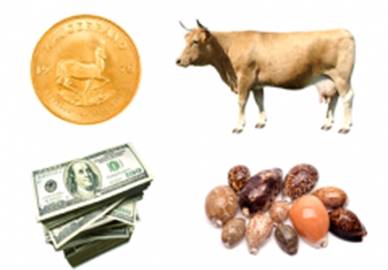
1. History of Money
The use of money is as old as the human civilization. Money is basically a method of exchange, and coins and notes are just items of exchange. But money was not always the same form as the money today, and is still developing.
The basis of all early commerce was barter, in other words the direct exchange of one product for another, with the relative values a matter for negotiation. Subsequently both livestock, particularly cattle, and plant products such as grain, come to be used as money in many different societies at different periods. The earliest evidence of banking is found in Mesopotamia between 3000 and 2000 B.C. when temples were used to store grain and other valuables used in trade.
Various items have been used by different societies at different times. Aztecs used cacao beans. Norwegians once used butter. The early U.S. colonists used tobacco leaves and animal hides. The people of Paraguay used snails. Roman soldiers were paid a "salarium" of salt. On the island of Nauru, the islanders used rats. Human slaves have also been used as currency around the world. In the 16th century, the average exchange value of a slave was 8000 pounds of sugar.
Gradually, however, people began exchanging items that had no intrinsic value, but which had only agreed-upon or symbolic value. An example is the cowrie shell. Metal tool money, such as knife and spade monies, was also first used in China. These early metal monies developed into primitive versions of round coins at the end of the Stone Age. Chinese coins were made out of copper, often containing holes so they could be put together like a chain. The Chinese invented also paper money during the T'ang Dynasty.
Outside of China, the first coins developed out of lumps of silver. They soon took the familiar round form of today, and were stamped with various gods and emperors to mark their authenticity. These early coins first appeared in the Kingdom of Lydia (now in Turkey) in the 7th century B.C.. Paper money was adopted in Europe much later than in Asia and the Arab world -- primarily because Europe didn't have paper.
The Bank of Sweden issued the first paper money in Europe in 1661, though this was also a temporary measure. In 1694 the Bank of England was founded and began to issue promisory notes, originally handwritten but later printed. To make travelling with gold less dangerous, goldsmiths, or people who made jewelry and other items out of gold, came up with an idea. The goldsmiths started writing out notes on pieces of paper that said the person who had the note could trade the note in for gold. These promissory notes were the beginning of paper money in Europe. If you look at a British bank note today, you'll see it still says: I promise to pay the bearer on demand the sum of twenty pounds.
А) Paper Money of the Russian Empire
The first Russian paper money was issued in 1769 under Catherine the Great. It was the banknotes of 25, 50, 75 and 100 roubles value. The banknotes were rather plain, one-sided, printed in one colour. They had the frame, the text, the label and the signatures of four officials. It was easy to falsify this money. The counterfeiters took out the figure “2” and drew the figure “7”. In 1786 the denominations of the Russian money were changed in order to prevent the manufacturing of the false money: the banknotes of 75 roubles value became impassible. To make paper money widely used the banknotes of small value (5 and 10 roubles) were issued. Besides the new sort of paper for money printing was used. The first Russian money was inflationary. The budget of the country had been showing a loss with the expenses for the military needs covered by issuing more and more paper money. The currency reform was necessary.
Preparations for the first currency reforms lasted for about 20 years; the currency reform was completed in 1847 by E.F.Kunkrin. The main purpose of the Kunkrin’s currency reform was to make a paper rouble be equal to a silver rouble. The first step of the currency reform was issuing new banknotes of 5, 10, 25, 50, 100 and 200 roubles value in 1818-1819. The second step of the currency reform was issuing the deposit slips of 3, 5, 10, 25, 50 and 100 roubles value. Everyone who made a contribution in silver coins received deposit slips. The third step of the currency reform was issuing the credit slips. In 1847 new money, the state credit slips was issued, the old banknotes, deposit and credit slips became impassible. New money came in 1, 3, 5, 10, 25, 50, 100 roubles denominations. A paper rouble became equal to a silver rouble.
Having the printing technology improved the design of the Russian money issued after 1866 became more complicated. It was for the first time when paper money had the portraits of Russian tsars placed in the banknotes. Since then it has become a tradition.
B. Modern British Currency System
A pound sterling is the official unit of currency in the UK. 100 pence (like pennies) make a pound. Pence (also called 'p'), coin units come in 2, 5, 10, 20, and 50 pence denominations and also ₤1 and ₤2 coins. Paper currency comes in ₤5, ₤10, ₤20, and ₤50 denominations1.
Scotland has its own paper notes with the same value amounts, English paper notes are accepted in Scotland too. But it's best to get rid of your Scottish money before you journey back to England – they are sometimes frowned on in the south.
The Isle of Man issues currency with its own imprint in the same denominations as the UK except for a ₤5 coin. UK money is legal tender on the island, but the money of the Isle of Man is not accepted in the UK.
Northern Ireland is, of course, part of the UK and has the same currency. Not so the Republic of Ireland. It has adopted the Euro.
The Euro is accepted in many business establishments in the UK, but not all, so to avoid a hassle, get your money changed into the local currency. Euro notes come in 5, 10, 20, 50 and up denominations. Coins are in the same denominations as the UK ones.
Older British Currency System
Pound: A pound was the basic unit of currency. It came in the form of a paper bill, called a note, or a gold coin, called a sovereign. The slang term for a pound is a quid and there are other slang terms for various amounts of money. A monkey is 500 pounds, a pony is 25 pounds. Shilling: There were 20 shillings to the pound. The shilling was the workhorse of the currency. It was used to buy food and household necessities like coal, candles and soap. The slang term for a shilling was a bob.
Penny: The smallest unit of currency, the plural of which was pence. There were 12 pence to a shilling and 240 pence to a pound.
These were the basic coins of the realm, but not all. Some other terms which were used for some special coins - multiples and fractions of shillings and pence.
C. The USA Currency
The dollar ($) is the unit of currency of the United States, it consists of 100 cents (¢).Today there are coins of the denominations 1¢ (a penny), 5¢ (nickel), 10¢ (dime), 25¢ (quarter), 50¢ (half dollar officially, sometimes referred to as a fifty-cent piece), and $1 (dollar officially, but frequently referred to as a dollar coin).
The US dollar was originally created and defined by the Coinage Act of 1792. The first US dollars were silver or gold coins, but in 1862, paper money was issued without the backing of precious metals, due to the Civil War. Silver and gold coins continued to be issued and in 1878 the link between paper money and coins was reinstated. This disconnect from gold and silver backing also occurred during the War of 1812. Gold coins were withdrawn in 1933, silver coins continued to be issued for circulation until 1964, when all silver was removed from dimes and quarters, and the half dollar was reduced to 40% silver. Silver half dollars were last issued for circulation in 1969.
Currently printed denominations are $1, $2, $5, $10, $20, $50, and $100.
The dollar has also been adopted as the official and legal currency by the governments in a few other countries (Canada, Taiwan, Australia, Zimbabwe).
Americans charge several hundreds billion dollars on their credit cards every year. Plastic money has become an important part of American lift-style. When you want to pay for something, you’ll hear the question: “Cash or charge?” It is possible to buy what you want without waiting and collecting a necessary sum of money for a purchase, though there is a disadvantage: a high interest on the remainder if the price for a purchase exceeds the limit of a stipulated credit.
2. MONEY AND ITS FUNCTION Деньги и их функция
The main feature of money is its acceptance as the means of payment or medium of exchange. Основной характерной чертой денег является их признание как средства платежа и обращения. Nevertheless, money has other functions. Однако, деньги имеют и другие функции. It is a standart of value, a unit of account, a store of value and a standart of deferred payment. Они являются мерой ценности, расчетной единицей, средством сбережения и средством отсроченного платежа.
THE MEDIUM OF EXCHANGE Средство обращения
Money, the medium of exchange, is used in one-half of almost all exchange. Деньги, как средство обращения, используются в половине всех обращений. Workers work for money. Работники работают за деньги. People buy and sell goods in exchange for money. Люди покупают и продают товары в обмен на деньги. We accept money not to consume it directly but because it can subsequently be used to buy things we wish to consume. Мы признаем деньги, не потому что мы их непосредственно тратим, а потому что они могут быть использованы для покупки товаров, которые мы хотим потреблять. Money is the medium through which people exchange goods and services. Деньги – это средство, с помощью которого люди обменивают товары и услуги. Each person is simultaneously a seller and a buyer. Каждый человек является одновременно и продавцом и покупателем. There is a double coincidence of wants. Происходит двойное совпадение потребностей. Money is generally accepted in payment for goods, services, debts and makes the trading process simpler and more efficient. Деньги являются всеми признанным средством платежа за товары, обслуживание, долги и делает торговый процесс более простым и результативным.
OTHER FUNCTIONS OF MONEY Другие функции денег
Money can also serve as a standard of value. Деньги могут служить также мерой ценности. Society considers it convenient to use a monetary unit to determine relative costs of different goods and services. Общество находит удобным использовать денежную единицу для определения относительной стоимости различных товаров и услуг. In this function money appears as the unit of account, is the unit in which prices are quoted and accounts are kept. В этой функции деньги выступают в виде расчетной единицы, и являются счетной единицей с помощью которой назначаются цены и ведутся счета. To be accepted in exchange, money has to be a store of value. Для того, чтобы быть признанными в обращении, деньги должны выступать как средство сбережения. Money is a store of value because it can be used to make purchases in the future. Деньги – это мера ценности, так как могут быть использованы для покупок в будущем. Houses, stamp collections, and interest-bearing bank accounts all serve as stores of value. Дома, коллекции марок и имеющие интерес банковские счета – все служат средством сбережения. Since money pays no interest and its real purchasing power is eroded by inflation, there are almost certainly better ways to store value. Но в связи с тем, что деньги сами по себе не несут ценности и их настоящая покупательная способность уменьшается инфляцией, определенно существуют лучшие способы сбережения.
Finally, money serves as a standart of deferred payment or a unit of account over time. И наконец, деньги служат средством отсроченного платежа или как средство расчета через какой-то промежуток времени.
TYPES OF MONEY Типы денег
The most important types of money are commodity money, credit money and fiat money. Самыми важными типами денег являются товарные деньги, кредитные деньги и бумажные деньги. The value of commodity money is about equal to the value of the material contained in it. Ценность товарных денег почти равна ценности материала, содержащегося в них. The principal materials used for this type of money have been gold, silver and copper. Основными материалами, используемыми для этого типа денег, являются золото, серебро и медь. Credit money are documents with promises by the issuer to pay an equivalent in the standard monetary metal. Кредитные деньги – это документы с обязательствами выплатить их эквивалент в принятых денежных единицах. Fiat money is paper money the value of which is fixed by government. Бумажные деньги – это деньги, ценность которых определяется правительством. Fiat money in the form of banknotes is referred to as legal tender. И бумажная и кредитная формы денег являются общепризнанными, и правительство постановило, что все кредиторы должны брать деньги для погашения долгов. Banknotes are usually made from special high-quality paper, with watermarks, metallic strips and other features against forgery. Банкноты обычно изготовляются из высококачественной бумаги, с водяными знаками, металлическими полосками и другими чертами против подделки. Highly sophisticated printing techniques are used, and banknote designs have elements that are hard to copy. Также применяются высоко сложные печатные технологии, а дизайн банкноты имеет элементы, которые сложно скопировать. Fronts and backs of notes are printed separately, and serial numbers are added later. Лицевые и обратные стороны банкнот печатаются отдельно, и серийные номера добавляются позже.
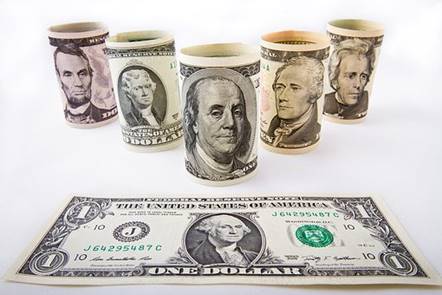
2. It is interesting «Countries and their currency »
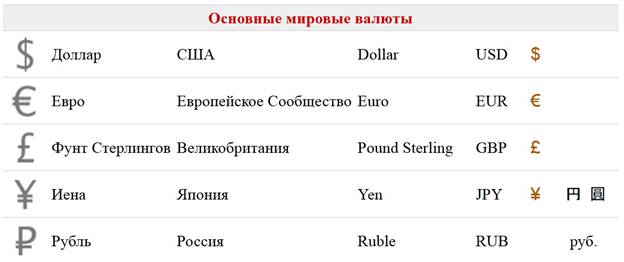
В мире существует семь основных валют, в которых осуществляется заключение большинства международных контрактов:
1.Американский
доллар - национальная валюта США, он также часто используется во многих странах
мира. После окончания Второй мировой войны Америке удалось стать сверхдержавой,
а доллару - главной резервной валютой. Разрушенная Европа не смогла
сопротивляться валютной экспансии Америки. Со временем репутация доллара стала
портиться, за последние 100 лет доллар сильно подешевел.
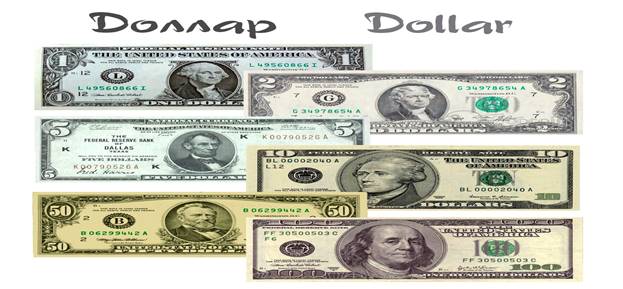
2.Евро
является денежной единицей многих стран Европы, с 2002 года в оборот ввели
банкноты, монеты. Символ евро был создан художником-графиком Артуром
Айзенменгером.
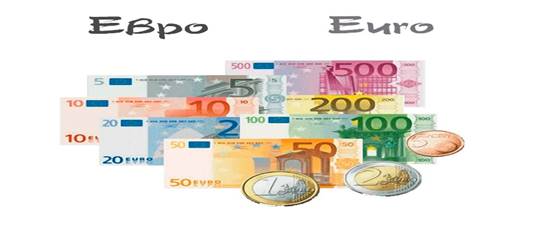
3. Фунт стерлингов -
валюта Великобритании, символ "£" произошел от латинского слова
«libra». Это одна из старейших мировых валют, название «фунт» произошло от
английской меры длины, а «стерлинг» означает «звездочка». На первых английских
монетах изображались символы, похожие на звезды. Великобритания не перешла на
евро, оставив традиционную для нее валюту.
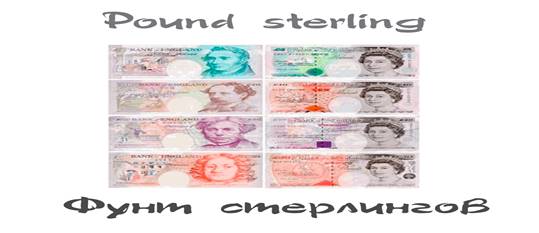
4. Японская Йена
в переводе означает «круг». Она появилась в 1871 году и пришла на смену старым
монетам. Как международная валюта она утвердилась в середине 20 века.
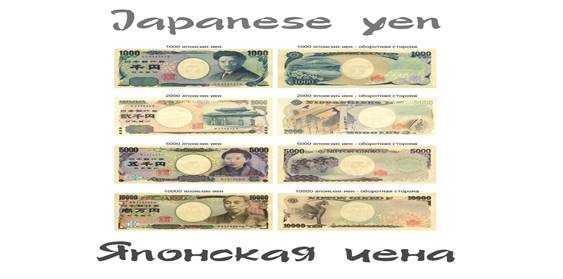
5. Швейцарский франк существует с
1850 года. Крепкая денежная система дала возможность стране стать офшорной
зоной с сильной банковской системой. Франки хорошо защищены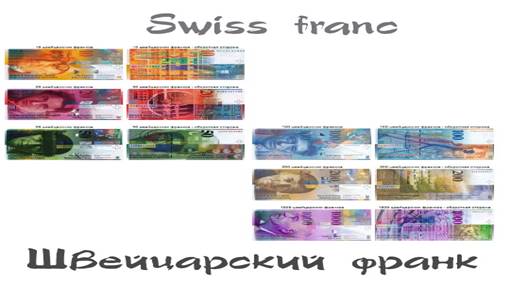
6. Австралийский доллар - валюта Австралии с
1966 года. Австралийские купюры изготовлены из пластика, они появились уже в
конце прошлого столетия. Австралия первой использовала полипропилен для
производства денежных купюр. Это позволило значительно увеличить их срок
службы.
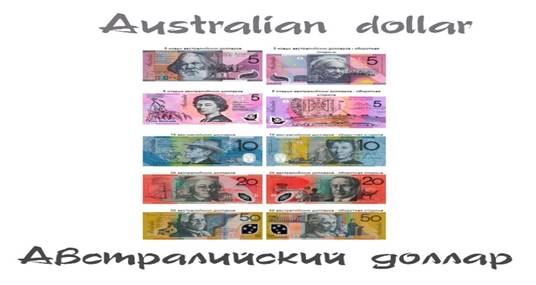
7.Канадский доллар часто изменял свой вид,
так как его постоянно подделывали. Его называют луни, в честь черноклювой
гагары, изображенной на монете. Двухдолларовую монету назвали туни, то есть два
луни.
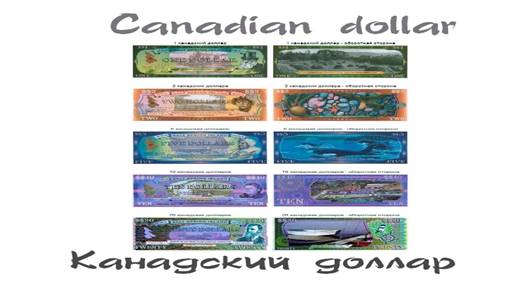
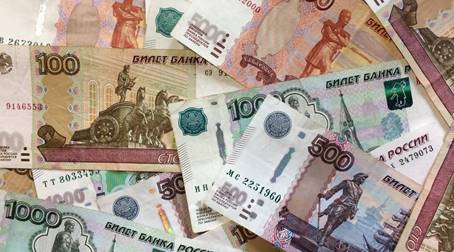
3. General vocabulary "Money and prices"
· good - товар
· pay - платить
· bargain - торговаться
· bargain price - договорная цена
· currency - валюта
· price - цена
· change - сдача
· discount - скидка
· sale - распродажа
· cheap - дешевый
· expensive - дорогой
· overvalued - переоцененный
· undervalued - недооцененный
· priceless / above price - бесценный
· cash - наличка
· credit card - карта
· check - банковский чек
· payment - платеж
· shop assistant - кассир
· seller - продавец
· buyer - покупатель
· tax - налог
· VAT (value added tax) - НДС (налог на добавленную стоимость)
· retail - розница
· wholesale - опт
· cash machine - кассовый аппарат
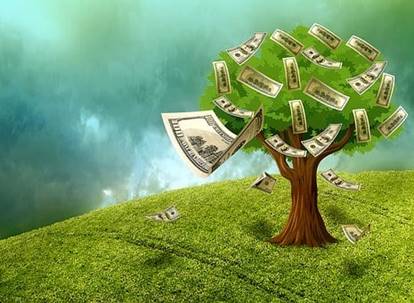
4. The main monetary verbs in English
С деньгами производят 10 основных действий.
1.deposit money (in/into) - размещать средства в банке
I deposited the check – Я открыла вклад
2.(with)draw money (from) - отзывать, снимать средства
I withdrew 500 dollars – Я сняла 500 долларов
3.transfer money (from/to)- переводить, перемещать средства
I transferred 1,000 dollars from my checking account to my savings account – Я перевёл 1 000 долларов с моего текущего счёта на депозит
4.save money (on) - экономить деньги
I saved 1,000 dollars this month – В этом месяце я сэкономил 1 000 долларов
5.borrow money (from) - занимать деньги
I borrowed 10 dollars from my friend – Я занял у друга 10 долларов
6.lend money (to) - одалживать, ссужать деньги
Banks lend money while customers borrow it – Банки ссужают деньги, а клиенты их занимают
The bank lent me money as a down payment on my house – Банк дал мне ссуду в счёт первого взноса за мой дом
7. owe money (to) - задолжать деньги
He owed the bank a lot of money – Он задолжал банку много денег
8. spend money (on) - тратиться
He spent a lot of money – Он изрядно потратился
9. waste money (on)- спускать, сорить деньгами
He wasted a lot of money on that TV – Он спустил кучу денег на тот телек
10.invest money (in/into)- вкладывать средства
We invested in the stock market – Мы вложились в фондовый рынок
Список английских глаголов, которые наиболее часто употребляются со словом a price.
|
Словосочетание |
Перевод |
|
to slash a price |
значительно снижать цену |
|
to double a price |
удвоить цену |
|
to increase a price |
повышать цену |
|
to put up a price |
повышать цену |
|
to raise a price |
повышать цену |
|
to bring down a price |
снижать цену |
|
to reduce a price |
снижать цену |
|
to keep a price down |
контролировать цену, не допускать повышения цены |
|
to lower a price |
снижать цену |
|
to pay a price |
платить цену, заплатить |
|
to charge a price |
взимать плату |
|
to set a price |
устанавливать цену |
|
to offer a price |
предлагать цену |
|
to quote a price |
указывать цену, назначать цену, называть цену (покупателям) |
|
to ask for a price |
просить цену |
|
to agree on a price |
договориться о цене |
|
to guarantee a price |
гарантировать цену |
|
to negotiate a price |
вести переговоры о цене, договариваться о цене |
|
to go for a record price |
продаться по рекордной цене |
|
to put a price on |
назначать цену за, установить цену на |
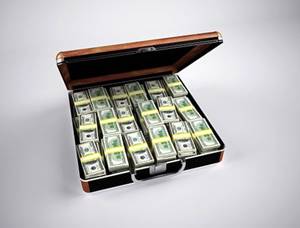
5. Interesting expressions with the word "money"
money spider — денежный паучок
money makes the world go round — деньги правят миром
money doesn’t grow on trees — деньги на дороге не валяются
to roll in money — купаться в деньгах; как сыр в масле
money talks — деньги решают все
time is money — время — деньги
a fool and his money are soon parted — у дурака деньги не держатся
for my money — по моему мнению
money for old rope/money for jam — работа — не бей лежачего
to have money to burn — денег — куры не клюют
to throw good money after bad — тратить деньги впустую
money answers all things — деньги решают все
a license to print money — золотое дно
to be flush in money — грести деньги лопатой
mad money — заначка
money spider — денежный паучок
money makes the world go round — деньги правят миром
money doesn’t grow on trees — деньги на дороге не валяются
to roll in money — купаться в деньгах; как сыр в масле
money talks — деньги решают все
time is money — время — деньги
a fool and his money are soon parted — у дурака деньги не держатся
for my money — по моему мнению
money for old rope/money for jam — работа — не бей лежачего
to have money to burn — денег — куры не клюют
to throw good money after bad — тратить деньги впустую
money answers all things — деньги решают все
a license to print money — золотое дно
to be flush in money — грести деньги лопатой
mad money — заначка
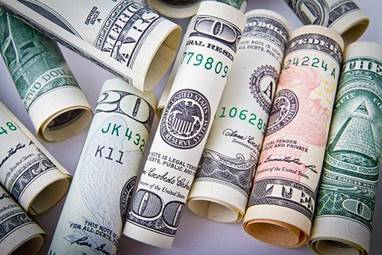
6. Lexical and grammatical exercises
Ex.1.Put each of the following words or phrases into its correct place in the text below:
banks, beads, buy, coins, currency, depositing, earn, exchange rate, goods, investments, money, paper bills, savings accounts, sell, shells, value, change
Money
1.
Money is what people use to …….things.
2. People spend money on ……and services.
3. Many people save part of their money by …… it in a bank.
4. People …… money by performing services.
5. They
also earn money from …… , including
government bonds, and from …… .
6.
…… can
be anything that people agree to accept in exchange for the things they …… or the
work they do.
7. Ancient peoples used such varied things as ……, ……,and cattle as money.
8. Today, most nations use metal coins and ……
9.
Different
countries' …… and bilk look different and have different
names.
10. A person can ……his money for the
money of any country according to the …… .
11.
Usually, such rates are set by the central ……of a
country.
12.The …… of a country's ……may change, depending on the economic and political conditions in that country.
Ex/2. Match
the definitions with the correct money word.
|
6. an investment - 9. an overdraft - 11. royalties - 12. a share- |
|
Ex.3. Translate small texts and answer questions:
The dollar.
The
dollar is the basic unit of United States money. It is worth 100 cents.
The dollar is also the main currency unit of: Australia, Canada, Jamaica, New
Zealand, Singapore, Zimbabwe and some other countries.
The dollar was adopted in the USA in 1792. The first US dollars were issued in
silver and gold. After 1934, however, all gold coins were taken out of
circulation. A silver dollar was issued at various times from 1794 until 1935.
The dollar was adopted in Canada in 1878. Australia adopted the dollar in 1966,
and New Zealand in 1967.
The pound.
The
basic unit of money of the United Kingdom is the pound, also called the pound
sterling. Today the pound is equal to 100 pence. the British adopted the
decimal system in 1971.
Things were far more complicated in the past. The pound was subdivided into 20
shillings. The shilling was subdivided into 12 pennies. The guinea was equal to
one pound one shilling. It was a gold coin used in fixing prices of valuable
goods. There also were crowns, 5 – shilling silver coins; halfcrowns worth 2
shillings and 6 pence; florins, 2 – shilling silver coins; bobs worth 12 pence.
a sixpence was a 6 – penny coin and a 3 – penny coin was called a “threepence”.
There also were “ha’pennies”, copper coins, worth half a penny, and farthings,
or quarter – penny coins
Questions:
1. What is the basic unit of money in the USA?
2. How much is dollar worth?
3. Where does the dollar circulate?
4. When was the dollar adopted in the United States?
5. Were the first dollars issued in copper?
6. Do gold coins circulate now?
7. When was the dollar adopted in Canada?
8. When did Australia and New Zealand adopt the dollar?
9. What is the basic unit of money in the UK?
10. When was the decimal system adopted in Great Britain?
11. How many shillings were there in the pound before 1971?
12. Was the guinea equal to one pound sterling?
13. What was the crown equal to?
14. Were there any copper coins in circulation?
Ex.4. Explain the meaning of the expressions:
|
1.To
be bad money |
a.To
have a lot of money |
Ex.5. Translate from Russian into English:
1. Я думаю, что это невыгодное дело.
2. Не беспокойся, у меня достаточно денег.
3. Мне кажется, что он “кует деньги”.
4. Старайся не привыкать (get used to) к “легким деньгам”.
5. По моему мнению, вы должны туда поехать.
6. Что ты предпочитаешь – металлические или бумажные деньги?
7. Начать это строительство означает “утопить деньги”.
8. Я думаю, ты ставишь деньги не на ту лошадку.
Ex.6. Translate from English into Russian short dialoges:
Customer: One loaf of brown bread and two buns, please.
Shop-assistant: Here you are.
Customer: How much is it?
Shop-assistant: 1 hryvnia 80 copecks.
Customer: Here are 2 hryvnias.
Shop-assistant: Here is your change, 20 copecks. Thank you.
***
Customer: One loaf of white bread, please.
Shop-assistant: Sorry, but it isn’t fresh.
Customer: what is fresh?
Shop-assistant: Only buns are.
Customer: Two buns, please.
Shop-assistant: Here you are. 80 copecks, please.
***
Customer: Have you any 60 copecks ice-cream?
Shop-assistant: Certainly.
Customer: Two ices, please.
Shop-assistant: Here you are.
Customer: Here is 1 hryvnia 20 copecks.
Shop-assistant: Thank you.
***
Shop-assistant: Do you want a hat?
Customer: Yes, I do.
Shop-assistant: What size? What colour?
Customer: My size is 50. Grey, please.
Shop-assistant: I think his hat is especially for you.
Customer: Do you think so? Let me try it.
Shop-assistant: This is a mirror.
Customer: Do you have a black hat of the same size?
Shop-assistant: Here you are.
Customer: How much?
Shop-assistant: Twenty hryvnias 20 copecks. To the cashdesk, please.
Exercises on the topic "Money" Card No. 1.
Exercise 1. Match the words and their definitions
|
1. barter |
A. hard objects found on beaches |
|
2. cattle |
B. weighing a lot |
|
3. shell |
C. the unit of money used in most European Union countries |
|
4. mixture |
D. to exchange things |
|
5. heavy |
E. the money used in a particular country |
|
6. currency |
F. cows and bulls |
|
7. euro |
G. change the form, character, or function of something. |
|
8. convert |
H. several different things together |
Exercise 2. Complete the sentences. Use the words:
currency/ heavy /as/ carry/ machine/ instead of/ mixture /barter /paper /convert/ coins
1. People used different things *** money.
2. To *** means to exchange things you have for the things you need.
3. First coins were made from a *** of gold and silver.
4. First coins were difficult to ***, because they were ***.
5. First paper money as well as first *** appeared in ancient China.
6. In Europe first *** money were made by the French government.
7. Now people carry plastic credit cards *** *** cash.
8. With a credit card you can take money from a cash *** every time you need.
9. Many countries in Europe have the same *** — euros.
10. Tourists usually need to *** their money into the local currency.
Exercise 3. Choose the correct variant and translate
1. I’ve just had to save/earn/pay £10 for a parking fine.
2. The policeman was speaking to HQ on his walkie-talkie/purse/wallet.
3. Try to lend/save/waste some money for your holiday.
4. We brought some change/shells/credit cards home from the beach.
5. One British euro/pound/lira is divided into a hundred pence.
6. How much did you earn/pay/borrow for the tickets?
7. Most EU states have crossed the Rubicon and adopted the dollar/rouble/euro.
8. Could you convert/change/pay for a £10 note (for two fives), please?
9. It’s not fine/financial/fair that she’s allowed to go and I’m not!
10. All right, I’ll lend/save/fine you the money.
14. You waste a lot of water by having a bath instead of/walkie-talkie/cash machine a shower.
Card No. 2.
Задание1. Вставьте нужные предлоги: for(3), at, from, in, up(2), out, of(3), on, by
1. The prices ……makeup products go …… $5 to $300 …… this store.
2. The prices …… holiday packages have slumped …… 20% this month.
3. Oil prices considerably fell …… Friday.
4. It seems that the prices …… fruit are not going to drop.
5. When a crisis broke ……, the food prices shot …… .
6.The prices …… essential goods started going …… .
7. I need to buy some flip-flops …… the summer season.
8. Just look …… these skirts. How much do they cost?
9. I bought this dress ……twenty dollars ($20)
Задание2. Напишите разговор в правильном порядке.
- Medium. Would you like to try it on?
- Yes, please.
- Oh, it suits you perfectly.
- What is the jacket made of?
- Really? Ok, then. I’ll buy it.
- What size is it?
- Excuse me. How much does this jacket cost?
- It’s £120.
- It’s made of leather.
Задание3. Переведите с русского на английский слова продавца
Assistant: Эти брюки на распродаже. Сегодня последний день.
Customer: Oh, well. Hmm. I like the fashion and colour is also good.
Assistant: 40 фунтов на распродаже. Обычная цена 60 фунтов.
Customer: Oh. That’s quite good. Have you got them in my size?
Assistant: Извините. У нас нет маленького размера. А как насчет этих брюк? Тот же фасон, только цвет черный.
Customer: Well, can I try them on?
Assistant: Sure. The changing rooms are on the left.
Customer: Вы принимаете чеки?
Assistant: Yes, of course.
Задание 4. Вставьте правильное слово из списка.
could, loaves, greengrocer's, offer, credit, much, order
1. Can I have two .... of bread, please?
2. The large department stores .... a great variety of products.
3. You can buy fresh vegetables at this .... .
4. .... I have the pills in this prescription, please?
5. I’d like to .... a bouquet of lilies, please.
6. Excuse me – How .... are these trousers?
7. Do you take a .... card?
Задание 5. Переведите
1. In Paris you can shop till you drop. Here there are a lot of boutiques, department stores, confectioner’s, antique shops, hair and beauty salons, jeweller’s.
2. The shops are open from 9 to 6 every day except Sunday.
3. The sales are usually in January and July in Brussels. I love this time because I can find some bargains.
4. This store is really big. In addition to fifteen bars and restaurants there is a travel agent’s, a dry cleaner’s and a bank.
Card No. 3.
Задание1. Соотнесите магазины с товарами, которые они продают.
1. bookshop a. a loaf of bread, rolls, long loaf
2. newsagent’s b. a bouquet of roses, lilies, flowers
3. bakery c. a packet of painkillers, pills, medicine
4. butcher’s d. a gold necklace, a diamond ring, pendent
5. confectioner’s e. a magazine, a newspaper, greeting card
6. greengrocer’s f. hairspray, a bottle of perfume, hand cream
7. chemist’s g. pralines, chocolate, cake
8. florist’s h. books, novels,
9. department store i. fruits, vegetables, apples
10. hair and beauty salon j. lamb chops, ham, sausages
11. jeweller’s k. leather suitcase, a woolen skirt, a clock
12. antique shop l. shampoo, products, household chemicals
13. supermarket m. an old clock, bric-a-brac, silver bell
Задание2. Напишите разговор в правильном порядке.
- Oh, OK. Can I try it on?
- Yes, please. The changing rooms are over there.
- How much is this T-shirt? I can’t find the price.
- Yes, of course. How can I help?
- Excuse me. Could you help me, please?
- let me have a look. Here it is. It’s £14.
Задание3. Переведите
1.These guys are charging an exorbitant price for this old car.
2. Unfortunately, price cuts failed to boost sales, so we had to close one of our stores.
3. It was in our interest to set a minimum price for these fabrics.
4. Mr and Mrs Walls managed to buy land in Cyprus at a knock-down price.
5. I had to haggle with the seller until he sold the fruit at a low price.
Задание 4. Переведите текст «English Banknotes and Coins»
The official currency of the Unites Kingdom is the pound sterling which is equal to one hundred pence. The British do not use the Euro. Although a few of the big shops will accept Euro, it is rarely used across Britain. English banknotes are issued by the Bank of England. As to coins they are minted also by this state bank. The following coins are in circulation: one penny, two pence, five pence, ten pence, 20 pence, 50 pence, 1 pound, and 2 pounds. The singular of pence is "penny". The symbol for the penny is "p"; hence an amount such as 50p is often pronounced "fifty pee" rather than "fifty pence". There are banknotes of the following denominations: £5, £10, £20, £50 and £100. On the face of English banknotes one can read the denomination given both in figures and in words. The inscription on the face of the banknote reads: I promise to pay the bearer on demand the sum of... And then there are two signatures. The first signature is that of the person authorized by the Government and the Bank of England. The second signature is that of the Chief Cashier. The back of English banknotes, like many other banknotes, feature portraits of different famous people. The current £5 note features Elizabeth Fry, who made her name fighting for improved living conditions for women in European jails.
Задание 5. Ответьте на вопросы по тексту
1. What is the official currency of the U.K.?
2. What is the smallest unit?
3. How many pence are there in one pound?
4. What banknotes and coins are in circulation in the U.K. now?
5. What famous people are featured on the back of various English banknotes?
Card No. 5.
Задание1. Переведите текст
Money has been the most disputable matter throughout the human history. What is money for? And when did it appear? Money is a universal means of payment and a means of exchange. It appeared thousands of years ago. First people used things like animal skin and precious metals as money. But it wasn’t easy to carry and store them. The money we use nowadays is made of paper and cheap metals. They are banknotes and coins of different value.Everybody uses money in our modern world. We all need money, we think about it and work for it. It is difficult to imagine today’s life without banknotes and coins, credit cards and cash. Modern technologies have influenced the way of payment: and plastic cards are becoming more and more popular today and they can be accepted even abroad. It’s really convenient and safe for travelers because you don’t have to carry the money in your wallet or exchange the currency in order to make purchases in foreign countries. We need money to live and buy desired things and services. We can’t travel around the world, buy a car, rent an office, use the Internet or just buy food and clothes without money. People who earn much money can afford luxury goods: expensive cars and fantastic mansions, precious stones and unique works of art. The more money you earn, the more products you can buy. Happiness depends both on material and spiritual things. And you can’t buy health, love or true friends with money.
Задание2. Вставьте пропущенные выражения по смыслу:
According to1)___________, most teenagers spend their pocket money on computer games and consoles. Number two in the teenager's spend list 2) _____________. The same research shows that the amount of money that teenagers spend on the 3) __________amount of money that adults pay for the bills. Another 4) ________________is wasted in retailer shops. Teenagers like to buy best sellers. At the same time adults do not enjoy mainstream.It is also reported 5) ___________by credit card while and adults prefer to pay in cash.
Задание 3. Переведите пословицы о деньгах:
1. You waste your money on things that aren’t necessary. Don’t you know that a penny saved is a penny earned?
4. One shouldn’t waste all the money at once but save a small amount for a rainy day.
7. How did you achieve such a success in a short time? — Money talks, doesn’t it?
Задание 4. Переведите на английский язык
1. Извините, где ближайший банкомат?
2. В стране заработал валютный рынок
3. Я бы тебе помог, но у меня сейчас туго с деньгами
4. Можешь одолжить мне наличку? Верну сразу, как получу зарплату
5. У вас есть задолженности по кредитам?
6. Нам нужно повысить свой доход, если мы хотим избавиться от долгов
Задание №5. Подберите правильный вариант
|
1. Деньги на улице не валяются. |
a. Money has no smell. |
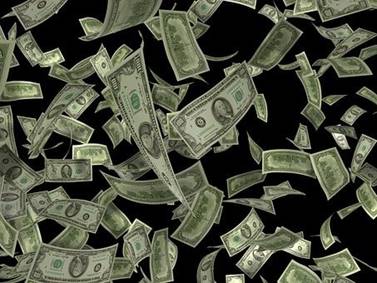
Control work
Задание1. Переведите текст «Price and Value» и ответьте на вопросы:
In this chapter we discuss the basic determinants of price. Price is not the same thing as value. Things are 'valuable' because people think they are, and for no other reason. The 'value' which an individual places on a commodity can not be measured; its value will be different for different people. This kind of subjective value is not the concern of the economist who is interested only in 'value in exchange'. The economic worth of value of a good can only be measured in some kind of market transaction which reveals the value of the good in terms of what is offered in exchange for it. If 5 Ib of potatoes will exchange for 5 Ib of sugar, then the 'price' of 1 Ib of sugar is 5 Ib of potatoes. Nowadays practically all exchanges represent an exchange of goods and services for money, and prices in terms of money are the market value of the things they buy.
Markets
Prices arise in exchange transactions and this implies some kind of market. This need not, necessarily, be a fixed location - a building, or a market place. We are all familiar with the open and covered markets in the centres of our towns, but in the modem world the word 'market' has a much wider meaning. Any effective arrangement for bringing buyers and sellers into contact with one another is defined as a market. The small ad. columns of the local newspaper provide a very efficient market for second-hand cars. Face to face contact between buyers and sellers is not a requirement for a market to be able to operate efficiently. In the foreign exchange market, buyers and sellers are separated by thousands of miles, but the knowledge of what is happening in the market is just as complete, and the ease of dealing is just as effective as if the participants were in the same room.For some commodities, notably fresh fruit and vegetables, the traditional market is still the normal arrangement, but for most goods the market is a national one. Most consumer goods, in developed countries, are bought, and sold on a countrywide basis. For other commodities the market is world-wide. This is particularly true of the more important primary products such as rubber, tin, copper, and oil, and of the basic foodstuff's such as meat, wheat, sugar, tea, and coffee. Most of the products of advanced technology also have world markets, for example, computers, aeroplanes, ships, and motor cars.
The price of any economic good, under market conditions such as we find in the capitalist world, is determined by the forces of supply acting through the sellers and the forces of demand acting through the buyers, determine the market price.
Questions
1. What is the difference between 'price' and 'value'?
2. Where do prices arise?
3. What kind of goods are usually sold in fixed locations?
4. What kind of goods are primarily sold and bought on a countrywide basis?
5. For what products is the market world-wide?
Задание2. Переведите на английский язык:
1.Любая эффективная договоренность относительно того, чтобы свести покупателей и продавцов друг с другом рассматривается как рынок.
2.'Ценность' на ценнике на товаре не могут быть измерена; его ценность будет различна для различных людей.
3. Большинство товаров народного потребления, в развитых странах, куплено, и продано на общенациональном рынке.
4.Свести лицом к лицу покупателя и продавца- не обязательное требование для рынка, чтобы он работал эффективно.
5. На валютном рынке покупатели и продавцы отделены тысячами миль,
8. We are all familiar with the open and covered markets in the centres of our towns, but in the modem world the word 'market' has a much wider meaning.
Задание3. Запишите предложения, заполнив пропуски данными словами. Подчеркните вставленные слова и переведите предложения письменно на русский язык.
Supply, transaction, determinants, concern, arise, advanced, value, meaning, markets, conditions, worth, demand.
1. In this chapter we discuss the basic ……. of price.
2. Price is not the same thing as ……
3. This kind of subjective value is not the…… of the economist.
4. The economic ……of value of a good can only be measured in some kind of market ……
5. Prices ……in exchange transactions.
6. In the modem world the word 'market' has a much wider ……
7. Most of the products of …… technologies also have world ……
8. The price of any economic good under market ……is determined by the forces of ……and ……
6. Выберите из слов, данных ниже, синонимы и запишите их парами.
1.Transaction-
2.Price-
3.Especially-
4.Developed-
5.Basic- main,
6.take place-
7.purchaser-
8.commodity-
9.kind-
10.reveal-
buyer, аdvanced, dealing, happen, discover, cost, good, particularly, sort, main,
Задание 4.. Выберите из слов, данных ниже, антонимы и запишите их парами.
1.Same-
2. False-
3. Ignorance-
4. Domestic-
5. New -
6. wide –
Foreign, knowledge, narrow, different, true, second-hand.
Задание 5. Составьте и запишите предложения из слов, данных вразбивку.
1thing, is, as, value, price, not, same, the.
2. will, its, different, different, for, be, people, value.
3. arise, exchange, transactions, prices, in.
4. word, this, a, has, meaning, wider, much.
5. commodities, some, for, market, the, normal, traditional, still, is, arrangement, the.
6. Is, for, worldwide, other, market, the, commodities.
Задание №6. Вставьте нужные предлоги: for(3), in( 4) , with(2), by, of(7), into, to
1. The economic worth …..value ….a good can only be measured …… some kind of market transaction.
2. Nowadays practically all exchanges represent and exchange …..goods and services ……money, and price…… terms …..money are the market value….. the things they buy.
3 We are all familiar ……the open and covered markets …… the centres ……our towns.
4 Any effective arrangement ……bringing buyers and sellers ……contact ……one another is defined as a market.
5. Face ……face contact between buyers and sellers is not a requirement ….. a market to be able to operate efficiently.
6……. the foreign exchange market, buyers and sellers are separated ……thousands ……miles.
TEST 1.
1. Which country's currency is the krona?
a. Sweden b. France c. Belgium
2. Which countries' currencies are dinars?
a. Jordan, Iraq, Kuwait, b. India, Pakistan, Uruguay c. Cuba, Uzbekistan, Paraguay,
3. Which country's currency is the drachma?
a. Greece before the introduction of the Euro b. Turkey c. Arab emirates
4. Which country's currency is not the euro?
a. France b. Germany c. Great Britain
5. Which of the currencies is the currency of Turkey?
a.,Dinar b. Lira c.Lari
6. Is the rial the currency of Iran and Yemen?
a. Yes b. No
7. Which of the currencies used to be the currency of France?
a. Lira b. Livre c.Rial
8. Is the pound the currency of Syria?
a. No b. Yes
9. German currency to Euro.
a. Mark b. Frank c.Pound
10. Which country's currency is tugriki?
a. Tajikistan b. Turkmenistan c. Mongolia
TEST.2.
Establish a correspondence between the country and its national currency.
1.. Britain- a) lira
2. Bulgaria- b) forint
3.China- c) lira
4. Denmark- d) lieu
5. Kazakhstan e) rupee
6.France- f) ) tugric
7. Hungary- g) levy
8. India- h) yenа
9. Italy i) pound
10.Japan- J) tenge
11. Mongolia- k) franc
12.Romana- l) crone
13.Turkey- n) yuan
TEST 3.
Can you speak about prices, или О ценах на английском языке
Choose the correct answer
2.When we hear the price of something, they say:
a) It is £15.67. B) They is £15.67. c) This is £15.67.
3. When the price is without tax they say the tax is ...
A) incl. B) inc. C) excl.
4. When we say we will never do it, we say:
A) Not price. B) What price. C) Not at any price.
5. A price tag shows ...
A) who we need to pay. B) where we need to pay. C) how much we need to pay.
6. VAT is ...
A) a price. B) a tax. C) a country.
7. When we buy something at a wholesale price, it is the price for goods sold in ...
A) one piece. B) large quantities. C) one day.
8. A discount price is ...
A) a lower price. B) a higher price. C) a price to count.
9. When prices skyrocket, they ...
A) go to the sky. B) go up. C) go down.
10. When something is above price, it is ...
A) very cheap. B) impossible to buy. C) very rich.
9. Money Quiz
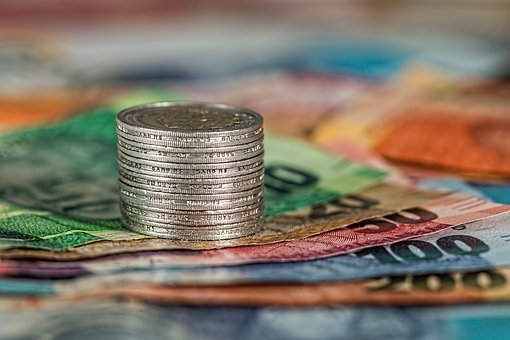
Answer questions:
1. What is more expensive: gold or silver?
2. Why are the first tomatoes very expensive, and then they get cheaper?
3. Name the monetary unit of the United States. 4.
Name the monetary unit of England.
5. Name the monetary unit of Germany.
6. Name the monetary unit of Japan.
7. Name the monetary unit of Italy.
8. What is "black gold"?
9. What is "currency"? 1
0. What is "loan"?
11. What is export?
12. What is import?
13. What is the difference between "wholesale price" and "retail price"?
14. Why do newspapers agree to print ads?
15. What is a "barter transaction"?
16 How many cents in one dollar?
Financial Test
Choose the correct answer:
1.Who, according to the proverb, pays twice?
a) Kind; b) Generous; c)Stingy; d) Forgetful.
2. What epithet is awarded to high prices?
a) Fabulous; b) Anecdotal; c) Poetic; d) Epic.
3. What is the name of a certain quantity of goods?
a) Block; b) Batch; c) Sect; d) Gang.
4. What gives rise to demand?
a) A Word; b) A sentence; c) A phrase; d) A Paragraph.
5. What does the accountant hand over at the end of each quarter?
a) Delivery; b) Office; c) Balance; d) Exams.
6. What is cheaper during inflation?
a) Bread; b) Electricity; c) Oil; d) Money.
7. From which Latin verb does the word "advertising" come?
a) Shout out; b) Impose; c) Deceive; d) Lure.
8. In which Russian city is there a Bank bridge?
a) In Moscow; b) In St. Petersburg; c) In Yekaterinburg; d) In Samara.
9. What do journalists call an underdeveloped country with an agrarian-type economy?
a) Banana Republic; b) Pineapple Federation; c) Coconut monarchy; d) Potato tribe.
10. Which mythological character turned everything he touched into gold?
a) Sisyphus; b) Damocles; c) Midas; d) Zeus.
Financial ABC
Correlate financial terms with the description:
|
1. Currency. 2. Advertising. 3. Inflation. 4. Bank. 5. Check. 6. Fee. 7. Receipt. 8. Import. 9. Business. |
A). A special institution, an institution designed to carry out a variety of operations, actions with money. Very often these institutions burst B). This word in English means business. In general, this is the activity of a person or group of people, carried out at their own expense, under their own responsibility. C) The monetary unit of any country used and legalized in the country. D) Monetary remuneration paid to the authors of literary and musical works published in the press. E) Import into the country of foreign goods purchased abroad or other valuables for their use. F) An increase in the prices of goods, leading to a decrease in the number of goods that can be purchased, purchased for one monetary unit. G). A document, an official receipt issued to a person to confirm the fact of receiving monetary payments, goods or other valuables from him. H) Open notification by the company of possible buyers, consumers of goods and services produced by it about the quality, advantages, advantages of these goods and services. She should not defame the goods and services of other firms, otherwise she is unscrupulous. I) A monetary document of an established form that plays the role of money and can be used instead of money as a means of payment.
|
Скачано с www.znanio.ru
Материалы на данной страницы взяты из открытых источников либо размещены пользователем в соответствии с договором-офертой сайта. Вы можете сообщить о нарушении.